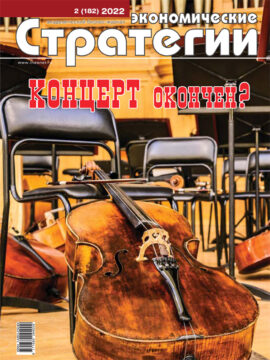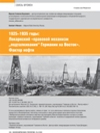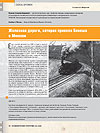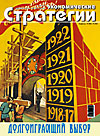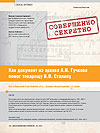How the Fuhrer and Others Like Him Forced out Soviet Oil from the German Market
DOI: 10.33917/es-3.189.2023.118-131
Based on diplomatic documents, a detailed picture of driving oil product suppliers – the Soviet companies, Derop and Derunaft – out from the German market during 1933 is restored. Soviet intelligence materials prove that one of the inspirers of this process can be considered the major Anglo-Dutch oil tycoon Henry Deterding, who in the course of the alleged “crusade” against the USSR, among other things hoped to seize the Caucasian oil fields.
References:
1. Morozov S.V. K voprosu o roli neftyanogo faktora v evropeiskikh mezhdunarodnykh otnosheniyakh v techenie 1933–1935 gg.: VII chteniya, posvyashchennye pamyati R.L. Yavorskogo: Materialy Vserossiiskoi nauchnoi konferentsii s mezhdunarodnym uchastiem[On the question of the role of the oil factor in European international relations during 1933–1935: VII readings dedicated to the memory of R.L. Yavorsky. Materials of the All-Russian Scientific Conference with International Participation]. Novokuznetsk, RIO KuzGPA, 2011, 288 p.
2. Morozov S.V. Khronika vytesneniya sovetskoi nefti s germanskogo rynka v techenie 1933 g.: IX chteniya, posvyashchennye pamyati R.L. Yavorskogo: Materialy Vserossiiskoi (s mezhdunarodnym uchastiem) nauchnoi konferentsii[Chronicle of the displacement of Soviet oil from the German market during 1933: IX readings dedicated to the memory of R.L. Yavorsky. Materials of the All-Russian Scientific Conference with International Participation]. Novokuznetsk, RIO KuzGPA, 2013, 320 p.
3. Gekht E.V. Neft’ v politike Germanii (1933–1943) [Oil in German Politics (1933–1943)]. Avtoref. dis. … kand. ist. nauk. Ekaterinburg, 2007. 22 s.
4. Medlicott W.N. The Economic Blockade. Vol. 1. L., Longmans, Green and Co., 1952, 756 p.
5. Birkenfeld W. Der synthetische Treibstoff 1933–1945: Ein Beitrag zur nationalsozialistischen Wirtschafts- und Rüstungspolitik. Göttingen, Berlin, Frankfurt, Musterschmidt-Verlag, 1964, 278 p.
6. Teichert E. Autarkie und Grossraumwirtschaft in Deutschland 1930–1939: Aussenwirtschaftpolitische Konzeptionen zwischen Wirtschaftskriese und Zwseitem Weltkrieg. München, Oldenburg, 1984, 390 p.
7. Mejcher H. Die Politik und das Öl im Nahen Osten. Bd. 2: Die Teilung der Welt 1938–1950. Stuttgart, Klett-Gotta, 1990, 490 p.
8. Karlsch R., Stockes G.R. Faktor Öl. Die Mineralölwirtschaft in Deutschland 1859–1974. München, C.H. Beck Verlag, 2003, 460 p.
9. Kockel T. Deutsche Ölpolitik 1928–1938. Berlin, Akademie Verlag GmbH, 2005, 393 p.
10. Klein B.H. Germany’s Economic Preparations for War. Cambridge Massachusets, Harvard University press, 1959, 272 p.
11. Friedwald E.M. Oil and the War. L., Heineman, 1941, 88 p.
12. Pеarton M. Oil and the Romanian State. Oxford, Clarendon press, 1971, 361 p.
13. Sesyuli R. IG Farbenindustri[IG Farbenindustri]. Moscow, Gos. izd-vo in-i lit-ry, 1948. 244 s.
14. Bruks M. Neft’ i vneshnyaya politika[Oil and foreign policy]. Moscow, Izd-vo in-i lit-ry, 1949, 173 p.




